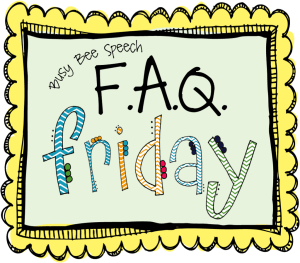Happy Friday! I’m enjoying my last Friday of summer today. Gotta love back to school time! Let’s check out the latest FAQ. . .
Today’s question has to do with baby signs. Several of my mommy friends are trying to decide whether or not to teach their babies sign language. Here’s what they’re asking.
They want to know if baby signs can cause spoken language delays, meaning will the child rely only on signs and not use words.
Well, not according to extensive research is what the consensus seems to be.
Let’s take a look at some of this research. According to this article on the Baby Sign Language website, studies have shown that using sign language with your baby actually increased their verbal abilities. It notes a study conducted by the National Institute of Health. Here’s what they found (quoted from babysignlanguage.com)
“The most significant research was an NIH funded study comparing two groups of 11 month old babies. One group was taught baby sign language. The second group was given verbal training. Surprisingly, the signing group were more advanced talkers than the group given verbal training. The lead of the signing group continued to grow, with the signers exhibiting verbal skills 3 months ahead of the non-signers at 2 years old. Their lead seemed to shrink a little after two years old, but even at three years old – the signers were still ahead1.”
They even checked on these kids at 8 years old and found that IQs of the kids that signed were 12 points higher than those that did not!
On BabySigns website, you can find even more research references that support the use of signing with your child. In addition to the study mentioned above, it also includes research conducted from centers, early head start research, and international research.
Sooo, using baby signs does not cause language delays in children. It looks like it, in fact, does the opposite! Kids who sign are communicating at an earlier age and are learning and practicing the give and take nature of social interaction.
I think sometimes people may ask this question because they might see a child using lots of signs at an age when other children are using words. But we don’t know if this child would have been delayed no matter what. At least by signing we know they have communicative intent and are able to express their wants and needs to their caregivers.
Sometimes as an SLP, I will teach signs to a child who is nonverbal to give them a means to communicate. It’s a great precursor for verbal language and I’ve seen nothing but positive results so far! 🙂
If you are planning on teaching your child/niece/nephew/grandchild/godchild baby signs, here are a few tips to remember:
- Always pair the sign with the word. When you teach your hearing child a new sign, you always want to teach them the spoken word along with it.
- Make it a fun social game. Smile and talk and go back and forth with your child. Encourage the social aspects of signing and communicating
- Be patient. Stick with a few easy words at first (such as: eat, more, stop, mom, finished) and move on once they have those down. Signing should help decrease frustrations for the child, not increase them.














I’ve reposted this on my facebook page. I teach sign during my Kindermusik lessons! This helps me explain all the benefits. It’s particularly helpful with my challenged kids, either physically or mentally. Have a visit, if you like. http://www.facebook.com/kindermusikwithmserin Blessings~ Ms. Erin
Thanks for sharing! I’ll be sure and check it out! 🙂
I love teaching sign language to typically functioning kiddos as well as my language impaired clients. It helps with so many language concepts like vocabulary development, requesting and social skills. Parents are sometimes hesitant to start signs but love how quickly their children pick up words and start using them everyday. Having good research to back up is helpful for nervous parents! I hope more parents will start teaching sign language to their children after reading your post! – Lauren Barnett, MA, CCC-SLP; http://www.iHeartSpeech.com
I agree, Lauren! It’s so beneficial to have that research in your back pocket in case parents raise concerns. Thanks for sharing! 🙂